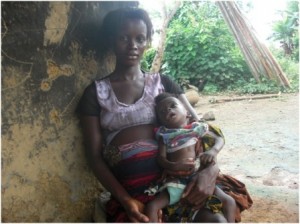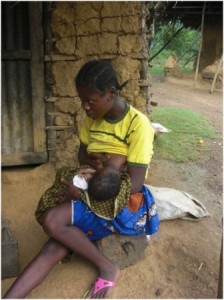
Forkpah Town, Clay Ashland, Tiny Pewee Wamah tries to hold the piece of boiled cassava his mother hands to him, but his tiny trembling hands soon let go and the cassava falls to the bright red earth. The 14-month-old baby tries to find strength to cry but his voice soon fades.
By New Narratives fellow Tecee Boley and FrontPage Africa intern Kara Freedman. See original post here.
He has pale skin, a shining forehead and very skinny legs and arms. Pewee is practically a skeleton, with almost no flesh to cover his bones.
Health workers at this clinic from the capital think he may only have a few months left to live before disease or starvation kill him. They say he needs immediate intensive care in a hospital but it is unlikely his poor mother will have the means to get him there.
Health workers here say the most frustrating part is that Pewee’s illness and likely death were entirely preventable. Pewee, like so many babies in Liberia, is suffering from severe malnutrition simply because of false beliefs on breastfeeding. Pewee’s mother Zennah has been told that breast milk is best for her child, but she says she stopped breastfeeding him when she resumed sex with her husband two months after the birth.
Zennah believes the widely held myth that sex made her milk contaminated and by drinking it Pewee would die.
“This boy, he was eating rice and sucking taytay \[breastfeeding],” says Zennah. “But when I (started having sex) I stopped giving it to him. When he sucks the taytay he can just get sick,so that’s why I take it from him. “
Sadly the reverse is true. It is Zennah’s decision to stop breastfeeding that will likely cost her child’s life, according to experts here.
A 2012 UNICEF study found that 15% of Liberian children die before their 1st birthday– one of the five highest rates of infant death in the world. Experts say the low level of breastfeeding here is a big part of the problem.
Mother’s breast milk is by far the most nutritious for babies. It contains all the nutrients babies need for the first 6 months of life and also transfers antibodies from the mother that can protect infants vulnerable to a range of diseases.
In a country like Liberia with poor water and sanitation breast milk is particularly important because it is sterile and carries no risk of disease or contamination as water does. The World Health Organization recommends babies get nothing but breast milk in their first 6 months of life and be breastfed along with food for two years.
But few Liberian babies get the benefits of this so-called “miracle food”. A range of widely held myths have convinced many parents that breastfeeding is actually dangerous for children. A recent report by Save the Children found that 80% of mothers breastfeed right after birth, but the number quickly drops after three months to 40% and only 30% at six months.
Insufficient breastfeeding early in life can lead to chronic or severe malnutrition according to experts, which can lead to stunted growth and even mental retardation, a situation that faces Pewee as he grows older. A child who has not exclusively received breast milk until the age of six months is more likely to die prematurely than one who is well nourished.
“If a child is malnourished then the child was done a bit of injustice,” says Katherine Faigao, Nutrition Officer at UNICEF. “That child wouldn’t be able to reach their full physical potential when it comes to height, and also mental cumulative development.”
Another young mother in this village named Jenneh Bracewell goes even further to protect her children from a mistaken belief that interaction with her husband will contaminate her breast milk. Bracewell’s husband sleeps on the floor just below the bed in an effort to avoid sex. They cannot even take a bath together, something they did regulary before she gave birth.
“If you do man and woman business (have sex) and you giving the baby taytay you will win (hurt) the child,” said Bracewell. “They say when you and the man take bath together you win the child. They say even when you and the man lay down and he touch you, you win the child. Me and my man can’t lay down on one bed. He can sleep on the ground.”
Dr. Olusola Oladeji health program manager at Save the Children dismisses this notion that having sex will affect the quality of a mother’s breast milk.
“An advantage (of breastfeeding) is actually that when women are breastfeeding properly, they are actually protected from getting pregnant. Breastfeeding also has a form of contraceptive advantage. “
Complications from birth also affect the health of children who live in rural areas. Pewee’s mother Zennah realized she was in labor only after all of the inhabitants of Forkpah Village had gone to the farm to work as they do every day. Zennah had to walk three hours to the nearest health facility in Tenegar. She did not make the clinic. She ended up giving birth to Pewee in a clearing beside the dirt path.
She blames this difficult birth for his health problems. “Today the hospital people tell me that he is too sick, his stomach has been running, he has diarrhea since last night, and his feet getting swollen up.”
Dr. Oladeji says while Pewee’s dangerous and unsanitary birth may have caused initial problems, his poor health today it is more likely the result of contaminated water and food that lacks sufficient nutrients.
“Breast milk has iron, and other micronutrients … and if they are not provided on time, it can even effect the baby in the future,” said Dr. Oladeji.“Some of these (nutrients from breast milk) are needed for the brain to develop and it starts from the beginning, from adequate breastfeeding.”
One of the most important parts of breast milk is the yellowish substance produced in the first few days after birth called colostrum, according to Dr. Oladeji. Because of its yellowish color many Liberian women throw it away believing another widespread myth that says it is not healthy for the baby.
According to Jenneh Bracewell, a child will die if it drinks the colostrum, because people believe it a part of the waste of giving birth in addition to the placenta.
Jenneh’s grandmother warned her against feeding the yellowish liquid to her child because she believed,another child in the village had died from drinking the substance.
“The girl deliver and the taytay water was yellow,” said Jenneh. “They say you must not give it to the child but she force it and give it and the child did not live.”
According to Dr. Oladeji, these beliefs are also false. The colostrum is “the best part (of the breast milk) in terms of nutrition because of the content,” he said. “It contains a high dose of antibodies, a high dose of protein.” According to Oladeji, when a child does not receive the colostrum, “that child misses a great opportunity” for protection against both disease and early malnutrition.
In rural communities such as Forkpah Village, community health workers are working to dispel these myths in addition to their medical duties.
“I am working with two groups of peer educators in the community to inform women about the importance of breastfeeding,” said Kolubo Davies, the nearby clinic’s midwife. “These stories about breastfeeding are far from the truth and I think people should know.”
Tecee Boley is a fellow of New Narratives, a project supporting independent media businesses in Africa. See more at www.newnarratives.org. Kara Freedman is a student at Pomona College in California, USA, interning at FrontPage Africa.

